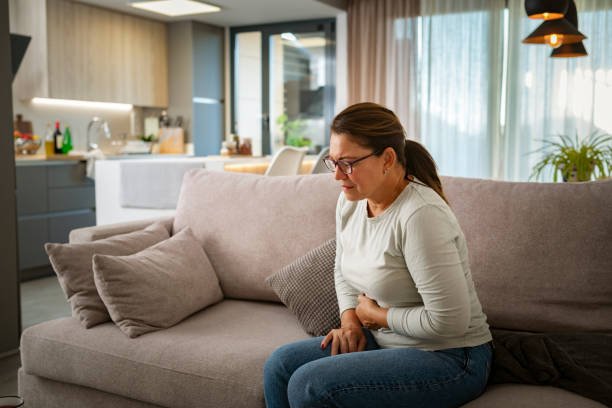It’s totally normal to have a bit of gas in your belly. You can try some home remedies or supplements to help get rid of gas pains and bloating.
On average, adults pass gas about 13 to 21 times each day. Gas is a natural part of digestion. However, if it gets stuck in your belly and you can’t let it out, it might start to hurt.
Things like eating too much, swallowing air when you eat or drink, chewing gum, smoking, or certain foods can make gas pain, bloating, and farting happen more often. If you’re dealing with gas that:
- bothers you a lot
- suddenly changes
- comes with constipation, diarrhea, or weight loss
It’s best to see your doctor. They can figure out what’s causing it and help you feel better.
11 suggestions for relieving gas
1. Peppermint:
Peppermint tea or supplements can help with gas caused by irritable bowel syndrome. Before using supplements, it’s a good idea to talk to your doctor because peppermint can affect iron absorption and some medications. Follow the directions on the supplement bottle, or for peppermint tea, have a cup before each meal.
2. Deep Breathing:
Taking deep breaths can be good for your body’s autonomic nervous system, which is linked to how your digestive system works. It might help your digestive system function better. But keep in mind, it doesn’t work the same way for everyone. Breathing in too much air can actually increase the amount of gas in your intestines.
3. Prescription Medications:
Depending on the cause of your gas, your doctor may prescribe medications for conditions like GERD, IBS, or IBD.
4. Diet:
If your gas isn’t due to a medical condition, it might be related to what you eat. Keep a food diary to identify culprits like high-fat or high-fiber foods, carbonated beverages, beans, and lentils. Once you know which foods cause gas, you can adjust your diet to avoid them.
5. Chamomile Tea:
Chamomile tea before meals and bedtime can help some people with indigestion, gas, and bloating. It might make your tummy feel better. Try sipping it before you eat or go to bed!
6. Activated Charcoal:
This over-the-counter medication helps eliminate trapped gas in your colon. Take tablets before and one hour after meals.
7. Lactase Supplements:
If you’re lactose intolerant, over-the-counter lactase supplements can help your body digest lactose found in milk.
8. Cloves:
Clove oil, made from an herb used in cooking, may reduce bloating and gas. Add 2-5 drops to an 8-ounce glass of water and drink after meals.
9. Apple Cider Vinegar:
If you’re dealing with a gassy tummy, trying some watered-down apple cider vinegar might help. Just mix a spoon of it in your water or tea and drink it before meals or up to three times a day, depending on what you need. People have found that doing this can make your stomach feel better by fighting the bacteria that cause gas and making your digestion work well.
10. Physical Activity:
Exercise, like walking after meals or activities such as jumping rope, running, or walking, can help release trapped gas and ease gas pain.
11. Over-the-Counter Medications:
Simethicone (Gas-X, Mylanta Gas, Phazyme) is an over-the-counter medication that consolidates gas bubbles, making them easier to expel. Follow dosing instructions and talk to your doctor if you’re taking other medications or are pregnant. Beano is another option, helping to break down sugars in beans and vegetables that can cause abdominal gas.
Health issues leading to gas, discomfort, and bloating.
Here are some common conditions that can lead to extra gas, pains, and bloating:
- Gastroenteritis
- Lactose intolerance
- Celiac disease
- Crohn’s disease
- Diabetes
- Peptic ulcer
- Irritable bowel syndrome
Avoiding gas
If there’s no specific medical condition causing the issue, you can try these simple changes to prevent gas:
- Sit down for meals and eat slowly.
- Be mindful not to swallow too much air while eating and talking.
- Quit chewing gum.
- Skip sodas and other fizzy drinks.
- Say no to smoking.
- Incorporate some exercise into your routine, like taking a walk after a meal.
- Avoid foods known to cause gas.
- Steer clear of drinking through straws.
Making these adjustments to your lifestyle and diet might help keep gas troubles at bay.
When to talk to a doctor
Sometimes, bloating can mean something more serious. It’s important to see a doctor if you have bloating or gas with:
- Strong pain
- Fever
- Vomiting for more than 24 hours
- Trouble keeping food down
- Bloody stools
- A physical injury, like getting hit in the stomach or a car accident
- Quick swelling of the belly
- Recent surgery
- Liver or kidney problems
FAQs
When should I worry about bloating?
If bloating suddenly changes or keeps getting worse without a clear reason, it’s a good idea to see a doctor. Bloating with bloody stools, fever, strong pain, difficulty eating, or frequent vomiting can be serious and needs urgent care.
What helps with belly bloating?
You can try home remedies or over-the-counter medicines for bloating. For example, take a walk, use an antacid or gas relief medicine, drink water, or use a heating pad.
Why does bloating make me look pregnant?
A swollen belly that looks like pregnancy could be from IBS or a condition called ascites, which might be related to liver issues. It’s best to talk to a doctor about it.
What causes bloating in the upper and lower belly?
Upper belly bloating could be due to slow movement in the intestine (gastroparesis), swallowing air while eating, an infection, or overeating. Lower belly bloating might come from constipation, IBS, gas caused by food intolerance, or holding onto fluids.
I suddenly have different bowel movements and lots of bloating. What could this be?
Any sudden changes in bowel habits with bloating should be checked by a doctor. In rare cases, these symptoms could be linked to ovarian cancer or colon cancer.
How can you quickly get rid of gas?
Changing how you’re sitting or lying down might help release gas from your belly faster. Certain positions, like lying on your side, can help push the gas out. Besides that, medicines and home remedies might take a bit of time to work, depending on why you have gas.
How long does trapped gas last?
Usually, trapped gas gets out of your system within a few hours. But if it doesn’t, it’s a good idea to see a doctor because it might be a sign of a more serious health issue.
Conclusion:
Feeling stuck with gas can be really uncomfortable, but there are simple ways to make it feel better fast.
If you have strong or ongoing gas pain, it’s a good idea to talk to a doctor, especially if you also have:
- Trouble going to the bathroom
- Runny or watery poop
- A fever
- Bleeding from your bottom
- Losing weight for no clear reason
Even though everyone deals with trapped gas now and then, having pain, bloating, or other stomach issues a lot might mean there’s a medical reason or something in your diet that doesn’t agree with you.ains pain and bloating. remedies, symptoms and causes


